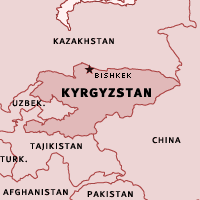 The International Committee of the Red Cross say at least 100,000 people have been displaced from their homes as a result of the crisis in southern Kyrgyzstan. An ICRC team which arrived in the remote area yesterday said Uzbek authorities have registered 75,000 adult refugees and an unknown number of children in Uzbekistan while tens of thousands remain stranded on the Kyrgyz side of the border. "We've seen for ourselves and also heard about pockets of displaced people ranging from several hundred to several thousand in number, so it's impossible to say with any certainty exactly how many people have been forced to flee their homes,” said Séverine Chappaz, the ICRC's deputy head of mission in Kyrgyzstan. “It's an immense crisis."
The International Committee of the Red Cross say at least 100,000 people have been displaced from their homes as a result of the crisis in southern Kyrgyzstan. An ICRC team which arrived in the remote area yesterday said Uzbek authorities have registered 75,000 adult refugees and an unknown number of children in Uzbekistan while tens of thousands remain stranded on the Kyrgyz side of the border. "We've seen for ourselves and also heard about pockets of displaced people ranging from several hundred to several thousand in number, so it's impossible to say with any certainty exactly how many people have been forced to flee their homes,” said Séverine Chappaz, the ICRC's deputy head of mission in Kyrgyzstan. “It's an immense crisis."ICRC staff visited the main detention centre in Kyrgyzstan’s second biggest city Osh where they delivered food provided by the World Food Programme to around 1,000 detainees. It was part of an emergency WFP operation to deliver food to 13,000 people affected by the humanitarian crisis. WFP said transporting aid from the capital Bishkek was difficult, as roads are not safe and commercial trucking companies are reluctant to risk their vehicles. “This crisis is unfolding rapidly and WFP is mobilising its global expertise to ensure that the vulnerable – particularly women and children – do not suffer,” said WFP’s Executive Director Josette Sheeran. “We implore all sides to ensure humanitarian access to the vulnerable, trapped by the crisis.”
Officially almost 200 people have died in that crisis though the real death toll is likely to be much higher. Osh, the stronghold of former president Kurmanbek Bakiyev, has been the epicentre of violence between ethnic Kyrgyz and ethnic Uzbek people for a week, though the roots of the violence date back a couple of months. Bakiyev was ousted from government in April in a coup that left 75 dead and hundreds injured in fighting between police and protesters. Ex-Foreign Minister Roza Otunbayeva said the opposition had taken over the reins of government and driven Bakiyev from office. Otunbeyeva was subsequently installed as interim leader.
However Bakiyev refused to accept the coup despite having lost the support of his Kremlin backers. He was first elected president in 2005 and re-elected in 2009 though there was a strong suspicion of electoral fraud in both elections. After the coup Bakiyev initially fled to Osh before eventually going to Kazakhstan. Bakiyev remained popular in the south of the country and it is not difficult to imagine his supporters being behind some of the violence that erupted spectacularly last week. The new Kyrgyz government was quick to blame Bakiyev for the violence. It said he hired "provocateurs" to instigate the deadly riots and they complained of a lack of international support, saying: "We were left alone with the enemy in the most difficult days."
However Kyrgyzstan’s most difficult days were not entirely Bakiyev’s fault. Clashes erupted on 11 June with the large Uzbek population of the city targeted by gangs. It soon spiralled out of control with possibly a thousand people dying in the clashes. It is not entirely clear who is driving the violence but it is tapping into ancient enmities. Ethnic Uzbeks make up 14 per cent of the country's population of 5.3 million but are almost half the population of Osh and neighbouring Jalal-Abad. In echoes of ethnic conflicts elsewhere, they are also a target being overly represented in the commercial class. Ex-pat Craig Murray in the British Telegraph suggests the violence may have been orchestrated by Moscow to undermine the overly Liberal Otunbeyeva regime.
The Kyrgyz administration has declared a state of emergency in the Osh and Jalal-Abad provinces and the next most important date for the interim regime is 27 June. On that date there will be a constitutional referendum to pave the way for parliamentary elections in October. The new leadership is determined to hold the vote, which it needs in order to entrench its legality. "The situation in Osh is stabilising. We have enough forces," said Azimbek Beknazarov, an interim deputy premier. “We need this [referendum] like air. Everyone who calls themselves a Kyrgyz citizen must vote."


